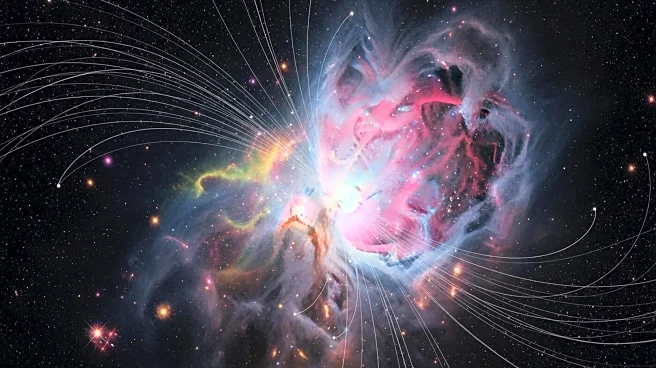What's Happening?
Researchers from SISSA, in collaboration with several universities, have conducted a study revealing that the Universe's first magnetic fields were significantly weaker than previously thought, yet they played a crucial role in cosmic evolution. Using around 250,000 computer simulations, the team explored the cosmic web, a filamentary structure connecting galaxies, to understand the influence of these primordial magnetic fields. The study, published in Physical Review Letters, suggests that these fields were billions of times weaker than a small fridge magnet, comparable to the magnetism generated by neurons in the human brain. Despite their weakness, these fields have left quantifiable traces in the cosmic web, influencing the formation of stars and galaxies. The research aims to refine our understanding of the early Universe and the processes that led to the magnetization of the cosmic web.
Why It's Important?
The findings have significant implications for our understanding of cosmic evolution and the formation of galaxies and stars. By establishing a new upper limit for the strength of primordial magnetic fields, the study challenges previous estimates and provides a more accurate model of the Universe's early stages. This research could lead to a better understanding of the cosmic web's density and its role in accelerating star and galaxy formation. The results also hold potential implications for theoretical models that enhance structure formation, offering insights into the fundamental processes that shaped the Universe. The study's conclusions could be further validated by observations from the James Webb Space Telescope, potentially leading to new discoveries in cosmology.
What's Next?
Future research will focus on validating these findings through observations made by the James Webb Space Telescope. The telescope's advanced capabilities may provide additional data to support the study's conclusions and offer new insights into the impact of primordial magnetic fields on cosmic evolution. Researchers will continue to explore the cosmic web's magnetization and its implications for galaxy formation, potentially leading to revisions in current theoretical models. The study's results may also influence future investigations into the cosmic microwave background and other aspects of the early Universe.
Beyond the Headlines
The study highlights the complex interactions between galaxies and the cosmic web, emphasizing the role of weak magnetic fields in shaping cosmic structures. This research contributes to broader studies on galaxy formation, dark matter, and the cosmic microwave background radiation. The findings underscore the importance of understanding the fundamental processes that occurred during the Universe's infancy, offering a glimpse into the intricate dynamics that govern cosmic evolution.









